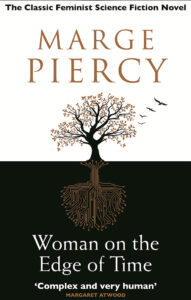Two sci-fi novels by two women, written 40 years apart, with female protagonists. Two topics – slavery and feminism – explored through space and time travel.
I think that sci-fi books are a great way to highlight our society’s problems in a bit of a sneaky way. Maybe reaching people, that would otherwise not read about these complicated topics. But it can be done in quite different ways…
An Unkindness of Ghosts

/…/ Aster lives in the low-deck slums of the HSS Matilda, a space vessel organized much like the antebellum South. For generations, the Matilda has ferried the last of humanity to a mythical Promised Land. On its way, the ship’s leaders have imposed harsh moral restrictions and deep indignities on dark-skinned sharecroppers like Aster, who they consider to be less than human.
When the autopsy of Matilda’s sovereign reveals a surprising link between his death and her mother’s suicide some quarter-century before, Aster retraces her mother’s footsteps. Embroiled in a grudge with a brutal overseer and sowing the seeds of civil war, Aster learns there may be a way off the ship if she’s willing to fight for it.
I read An Unkindness of Ghosts a while ago and did not write about it, because though I liked the writing and the general premise, I was not a fan of the world-building and the very plain slavery parallels. It all was a bit too heavy-handed for me – lower classes, dark-skinned, working on fields and not allowed to the upper levels, except for some who have found their way into the graces of some higher-class white-skinned people. But on a spaceship. In the future. I kind of could have just read some historical fiction instead. I guess I am just not the right age group for the book, I am sure that younger readers would be a better audience for it. Maybe see themselves more in the young main character.
Btw, the book was a Stonewall Book Award Nominee for Literature (2018), James Tiptree Jr. Award Nominee (2017), Lambda Literary Award Nominee for LGBTQ SF/F/Horror (2018), Hurston/Wright Legacy Award Nominee for Debut Novel (2018), Tähtivaeltaja Award Nominee (2019)
Woman on the Edge of Time

Hailed as a classic of speculative science fiction, Marge Piercy’s landmark novel is a transformative vision of two futures. Harrowing and prescient, Woman on the Edge of Time will speak to a new generation on whom these choices weigh more heavily than ever before.
After being unjustly committed to a mental institution, Connie Ramos is contacted by an envoy from the year 2137, who shows her a utopian future of sexual and racial equality and environmental harmony. But Connie also bears witness to another potential outcome: a dystopian society of grotesque exploitation. One will become our world. And Connie herself may strike the decisive blow…
A few months later I finished Woman on the Edge of Time, a ‘feminist sci-fi classic’. This book described gender inequalities and bigotry in two ways. Firstly in the present times of writing, through the life of the characters of that time. Secondly through a utopian future, where these problems are no more and thus making you think about your time in contrast to this (sadly) unrealistic future.
So, as you can tell, the second way works better for me – describing realistically the non-science fiction parts of the narrative and showing our society’s shortcomings by exploring a different one. More left to the imagination and future thoughts.
Woman on the Edge of Time by Marge Piercy, first published in 1976
An Unkindness of Ghosts by Rivers Solomon, published in 2017

